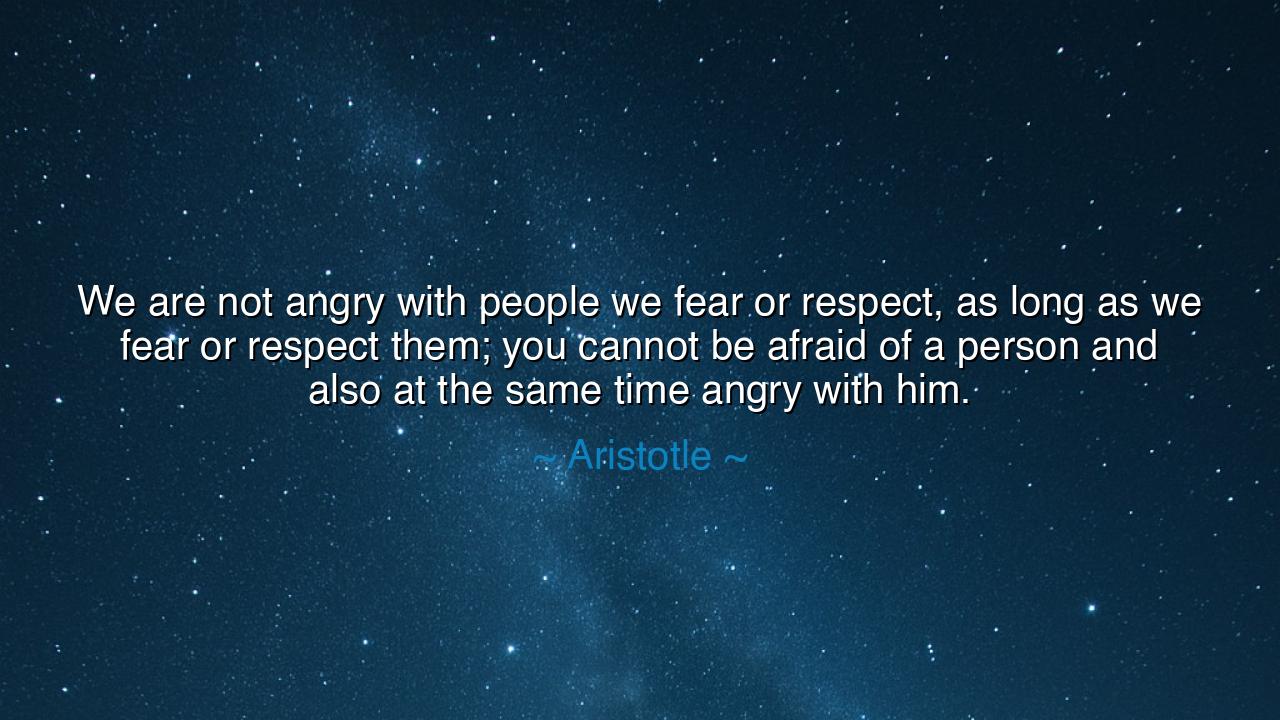
We are not angry with people we fear or respect, as long as we
We are not angry with people we fear or respect, as long as we fear or respect them; you cannot be afraid of a person and also at the same time angry with him.






In the words of Aristotle, "We are not angry with people we fear or respect, as long as we fear or respect them; you cannot be afraid of a person and also at the same time angry with him." These profound words reflect the intricate relationship between fear, respect, and anger, revealing a truth about human nature that transcends time and culture. Aristotle teaches us that fear and respect are emotions that inherently prevent anger from taking root. When we fear or respect another, we elevate them in our minds to a place where anger cannot easily survive—because anger is often born from a feeling of powerlessness or injustice, not from a sense of awe or admiration.
The ancients believed deeply in the balance of emotions and virtues. In Plato’s Republic, the philosopher speaks of the soul’s harmony, where reason rules over the passions. The ancients knew that anger arises from a perceived threat, and that fear—the emotion that arises from perceiving someone as superior or powerful—does not coexist with this reaction. Anger, in the ancient understanding, was linked to inequality and resentment. To be angry with someone was to believe that they were acting unjustly or without authority. However, fear and respect create a mental distance where anger cannot find fertile ground. The respected or feared individual is placed on a pedestal, beyond reproach, thus reducing the likelihood of conflict or resentment.
Consider the example of the mighty Alexander the Great, whose fear and respect for his father, King Philip II of Macedon, shaped much of his early character. Despite their complex and sometimes contentious relationship, Alexander revered his father, seeing him as a figure of immense power and authority. Even in moments where Alexander disagreed with or felt slighted by his father, he did not openly express anger. Instead, his respect for Philip as a ruler and a warlord created a kind of emotional distance, preventing the kind of resentment that could have led to open rebellion or anger. Aristotle’s words are echoed in the way Alexander and Philip navigated their relationship—rooted in respect and fear, which constrained any feelings of outright anger that might have otherwise emerged.
The same dynamic can be observed in ancient Rome, where leaders like Julius Caesar inspired both fear and respect in equal measure. Those who admired Caesar did so for his unparalleled military genius and political acumen. But there was also an undercurrent of fear, for Caesar was a man who commanded respect with the force of his will and the weight of his decisions. Even those who plotted against him, like Brutus and Cassius, did not act out of mere anger at Caesar’s actions but out of a complex mixture of fear, respect, and political necessity. Caesar’s leadership was so commanding that it neutralized the potential for anger to fester in the hearts of his closest allies—his presence, his power, and the respect he commanded effectively curtailed any feelings of emotional rebellion until the day of his assassination.
Aristotle’s insight into the relationship between fear, respect, and anger invites us to reflect on the dynamics of our own relationships with those we consider authority figures—be they in the family, workplace, or society at large. When we respect someone, we are more likely to understand their actions, even when they seem misguided. Fear does not always equate to hatred or resentment; rather, it often creates a psychological space where we are more cautious, more measured, and less likely to act on anger. In this way, fear and respect operate as stabilizing forces, keeping destructive emotions like anger in check, much as Aristotle suggests.
The lesson here is one of balance and reflection: when we feel anger rising, we must ask ourselves if the person we are angry with commands respect or if we are in some way diminishing them in our own mind to feel justified in our anger. To cultivate a life of peace, we must learn to either respect those we fear or, if that is not possible, to consciously remove ourselves from situations where we are likely to feel the stirrings of anger. In our relationships with leaders, mentors, or even family members, the more we choose to cultivate respect and see the strength in their positions, the less room there is for the destructive emotion of anger to take root.
In our daily lives, we can strive to embody Aristotle’s wisdom by seeking respect rather than resentment in all our relationships. Instead of focusing on what we disagree with or dislike, let us work toward understanding those in authority or those who challenge us. In doing so, we will not only cultivate stronger, more harmonious relationships, but we will also strengthen our own sense of self-control and wisdom. Just as the ancients sought to master their passions, so too should we aim to rise above the forces of anger, turning instead toward respect and understanding.






AAdministratorAdministrator
Welcome, honored guests. Please leave a comment, we will respond soon